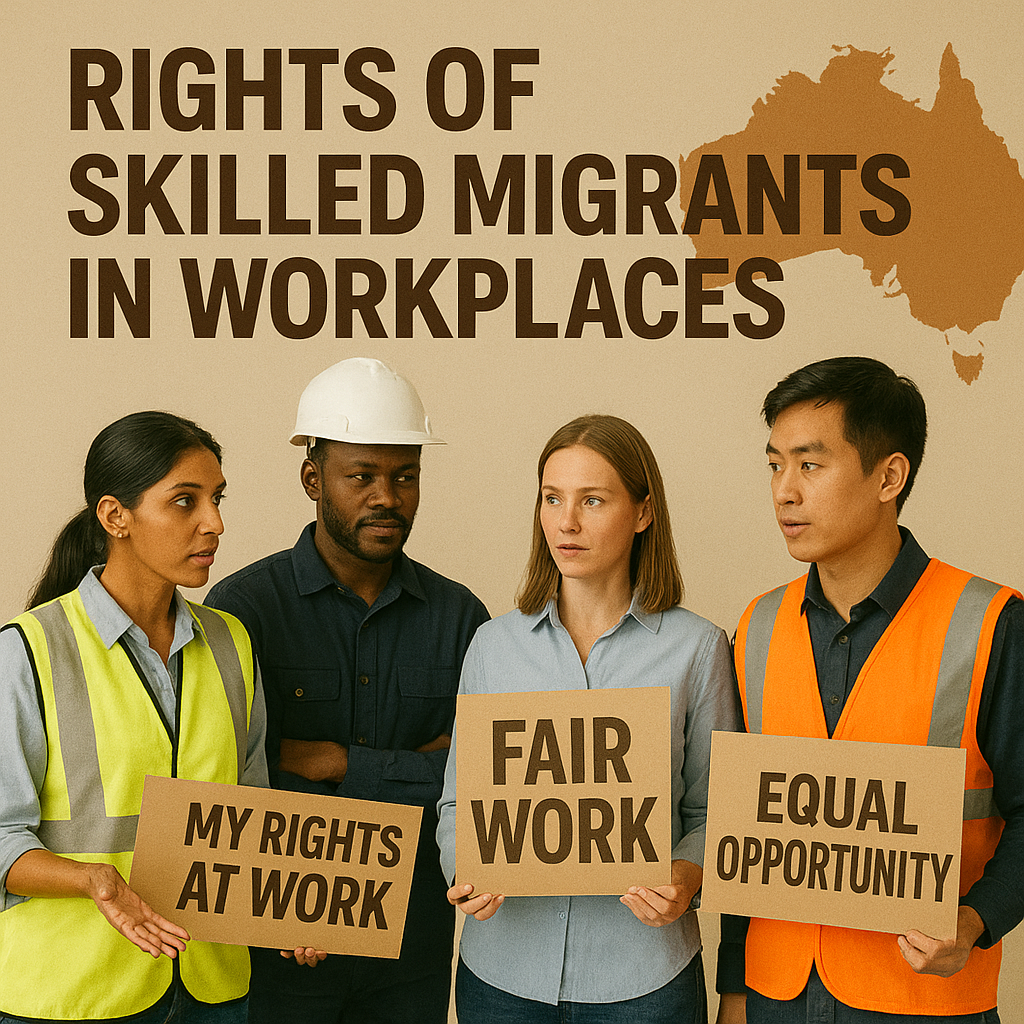Explore the legal rights of skilled migrants in workplaces, including protections against discrimination, fair pay, safety, and access to remedies for skilled visa holders.
Introduction
Skilled migrants contribute significantly to global economies, yet many face challenges understanding their rights in workplaces. Studies show skilled migrants may experience workplace discrimination or exploitation despite legal protections. Knowing your workplace rights as a skilled migrant not only protects you but empowers your career growth and integration. This article explains key rights of skilled migrants in workplaces, legal frameworks, common challenges, and practical advice for asserting your workplace entitlements.
Workplace Rights and Protections for Skilled Migrants
Equal Treatment and Non-Discrimination
Skilled migrants have the right to equal pay and employment conditions compared to local workers performing the same job. International labour standards—including the ILO conventions—mandate protection from workplace discrimination based on nationality, ethnicity, gender, or visa status. Australian workplace laws similarly forbid adverse treatment or harassment due to migration status or visa type.
Employers must not discriminate during hiring, promotion, remuneration, or termination decisions. Migrants who experience bias or unfair treatment can seek remedies through workplace regulators or anti-discrimination commissions.
Fair Pay and Minimum Wage Entitlements
Skilled migrant workers are entitled to the minimum wage and entitlements provided under national law or applicable awards. Underpayments remain a significant issue, but legal protections ensure migrants cannot lawfully receive less than Australian citizens or permanent residents. This entitlement covers wages, overtime, leave, and superannuation contributions.
Knowing applicable award rates or agreements specific to your industry is crucial for enforcing your wage rights. Workers can report violations confidentially without jeopardizing their visa status.
Workplace Safety and Health Rights
Safety at work applies to all employees, including skilled migrants. Employers must provide a safe and healthy working environment, adequate training, and proper equipment to prevent accidents and occupational diseases. Skilled migrants have the right to raise safety concerns without retaliation and to refuse unsafe work under international safety standards and national law.
Occupational health rights also require employers to accommodate disabilities or medical conditions in accordance with discrimination laws.
Addressing Common Challenges Faced by Skilled Migrants
Unfair Dismissal and Job Security
Despite legal protections, skilled migrants sometimes face wrongful termination or unfair dismissal due to visa status or perceived vulnerability. Australian employment law protects against unfair dismissal where workers have been employed beyond minimum qualifying periods, regardless of visa type. Migrants can challenge dismissal through courts or tribunals, seeking reinstatement or compensation.
Exploitation and Underpayment
Migrant workers may be vulnerable to exploitation through unpaid wages, excessive hours, or unsafe conditions, especially when employed informally or outside regulated sectors. Various government agencies and unions offer channels for reporting exploitation confidentially while safeguarding migrant rights.
Access to Justice and Remedies
Skilled migrants are entitled to access mechanisms such as labor courts, anti-discrimination bodies, and ombudsman services to resolve disputes. Visa status does not diminish these legal rights. Many countries also have migrant support organizations offering advocacy, translation, and legal assistance.
Freedom from Harassment and Bullying
Workplace harassment or bullying because of migration status or cultural background is unlawful. Migrants can file complaints with human rights commissions or occupational health and safety regulators. Employers are obligated to investigate and remedy verified harassment cases promptly.
Enhancing Skilled Migrants’ Rights: International Conventions and National Laws
International instruments such as the International Convention on the Protection of the Rights of All Migrant Workers and Members of Their Families (ICRMW) and the ILO Migrant Workers Conventions set global standards for migrant workplace rights, including equality, safety, and social security access.
National laws typically incorporate these conventions into statutes protecting migrant workers’ employment rights, social security eligibility, and union participation. For example:
- Australia’s Fair Work Act provides equal entitlements and remedies for visa holders.
- The EU legal migration framework offers protections including nondiscrimination and collective bargaining rights for skilled migrants.
Awareness of these frameworks helps skilled migrants assert their rights effectively.
Practical Tips for Skilled Migrants to Protect Their Workplace Rights
- Know your visa employment conditions: Confirm restrictions or allowances related to work type, hours, and employer sponsorship.
- Understand the applicable award or agreement: Research industry standards for wages, leave entitlements, and other conditions.
- Keep accurate records: Document pay slips, work hours, contracts, and communications in case of disputes.
- Report breaches confidentially: Use government bodies such as workplace ombudsmen, anti-discrimination commissions, or migrant worker hotlines.
- Seek support: Contact migrant advocacy groups, unions, or legal aid organizations for advice and representation.
Conclusion
Skilled migrants enjoy robust legal protections ensuring fair wages, safe workplaces, and equal treatment. Understanding the rights of skilled migrants in workplaces is essential for asserting entitlement, preventing exploitation, and succeeding professionally in a new country. By knowing the laws and available support, skilled migrants can navigate challenges confidently and contribute fully to their workplaces and communities.

